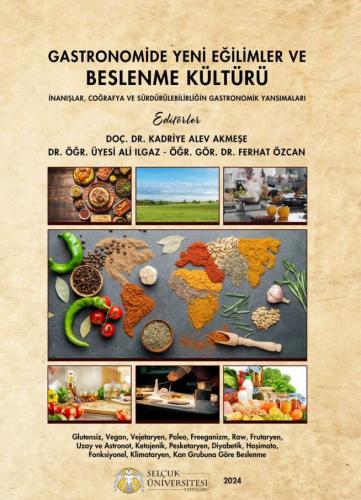
New Trends in Gastronomy and Nutrition Culture : Gastronomic Reflections of Beliefs, Geography and Sustainability
Synopsis
Gastronomy; It is an experiential and dynamic process that is affected by many variables such as the cultural structures of societies, their beliefs, the characteristics of the geography they live in and their interactions with other societies. Today, gastronomy refers not only to the products produced to meet nutritional needs within the local context, but also to producing and experiencing different tastes, intercultural interaction and new nutritional trends.
Increasing intercultural interaction with the influence of digitalization and social media brings innovations on the nutritional trends and gastronomy front. This book comprehensively covers the factors affecting gastronomy and emerging current nutritional trends. In this study, gastronomic structure is discussed in two separate contexts: the areas it is affected by and its trends. In the first four chapters, it is explained what influences the gastronomic structure and the remaining nine chapters explain the current nutritional trends that emerged as a result of the gastronomic and social structure.
In the first chapter, the effects of beliefs that have affected the lifestyles of societies throughout human history on the gastronomic structure were examined by Assist. Prof. Dr. Yüksel GÜRSOY.
In the second chapter, the effect of geographical conditions on nutrition is explained in detail by Kadriye Alev AKMEŞE and Ferhat ÖZCAN through the geographical regions of Turkey.
In the third chapter, the subject of sustainable tourism, which is one of the important issues of our age and affects gastronomic trends, and its effects on nutrition were written by Assoc. Prof. Dr. Halil AKMEŞE and Assoc. Prof. Dr. Sercan ARAS.
Waste management, which is one of the important issues in terms of sustainability and is important for gastronomic sustainability, is explained comprehensively by Assist. Prof. Dr. Engin TENGİLİMOĞLU in the fourth chapter.
In the fifth chapter, a detailed explanation of nutritional sensitivity, which can be expressed as gluten intolerance, especially known as celiac disease, and gluten-free nutrition is given by Lecturer Ercan POLAT.
In the sixth chapter, vegan and vegetarian nutrition trends, which are thought to have emerged as a result of beliefs and are preferred by many people for a healthy diet today, were written by Assist. Prof. Dr. Serpil Kaya.
In the seventh chapter, paleo nutrition, also referred to as stone age nutrition, which is used today to express a return to nature in terms of healthy nutrition, and freeganism nutrition trends, which emerged as a reaction to excessive consumption and waste, are discussed by Assoc. Prof. Dr. Yener OĞAN and Science Expert Halime KILINÇ.
In the eighth chapter, raw food and fruitarian nutrition trends, which draw attention to the importance of preserving the value of nutrients for a healthy diet, are explained comprehensively by Assoc. Prof. Dr. Alper ATEŞ, Doctor Lecturer Halil SUNAR and Scientific Expert Senem OK.
In the ninth chapter, the scope of space nutrition, food and astronaut nutrition, which emerged in the light of technological developments and attracted particular attention with space travels in the last decade, was written by Assist. Prof. Dr. Gülşah Güneş ŞAHİN.
The ketogenic diet, which was developed to ensure success in the treatment of epilepsy, which is an important health problem, and the pescatarian nutrition trends, which emerged as a healthy alternative to vegan and vegetarian nutrition trends, were explained in detail by Lecturer Enes GÜNDOĞDU in the tenth chapter.
In the eleventh chapter, nutritional contents for patients with diabetes and Hashimoto's disease, which are important and chronic health problems frequently encountered in our age, are explained by Assist. Prof. Dr. Nesrin TUNCAY and Lecturer Furkan TIRALİ under the title of diabetic and Hashimoto's nutrition trends.
Nutritional types according to body type and blood groups, which have attracted attention in healthy nutrition in recent years and express the ability of individuals to create a nutrition order by knowing themselves, were written by Assist. Prof. Dr. Ali ILGAZ and Lecturer Özlem YILDIRIM in the twelfth chapter.
In the thirteenth chapter, which is the last chapter, functional nutrition, which aims to provide more benefit from nutrients, and climatarian nutrition trends, which aim to minimize the impact of food consumption on the environment, are explained comprehensively by Lecturer Oğuzhan TINMAZ.
This study, in which the impact areas of gastronomy and nutrition cultures, their evolution process and current trends are examined and explained, was written by academics who are experts in their fields. The authors of the chapters in the book have assumed all scientific, ethical and legal responsibilities for their own chapters.
To all our valuable academicians who contributed to this work, which will guide students studying gastronomy and culinary arts and individuals interested in healthy nutrition, and their families who supported them, to the Selçuk University Administration and the editorial board of Selçuk University Publishing, who did not spare their support to contribute to the field at every stage of the study. We would like to thank Selçuk University Deputy Corporate Communications Coordinator Zeynep GÖKTAŞ and Beyşehir Ali Akkanat Tourism Faculty Gastronomy and Culinary Arts Student Şevval Zeynep AYHAN for their devoted support during the design process of the study.
Finally, we dedicate this work to the founder of our Republic, the Great Leader Gazi Mustafa Kemal ATATÜRK, and her esteemed comrades in arms.

